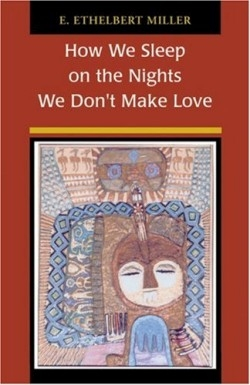How We Sleep on the Nights We Don't Make Love
Reading this book is like listening to a veteran blues player—B.B. King, say—one so sure of his craft that he seems totally unconcerned about showing it off. Casual as they seem, the author’s poems generate unexpected intensities out of understated, colloquial language.
The volume begins with a series of brief, almost occasional poems of love and friendship. The eleven-line “May 26, 2002” opens: “The Lakers won tonight because / Robert Horry hit a three pointer / at the buzzer. I miss you.” The transformation from ordinary moment to metaphor is swift, sure, charming, and entirely without presumption: “Sometimes,” the poem ends, “the music bounces like a ball and / love is something you can’t catch / so you keep shooting.”
Author of seven previous books of poems and a recent memoir, and editor of many anthologies, including the influential In Search of Color Everywhere: A Collection of African American Poetry, Miller has directed the African American Resource Center at Howard University for thirty years. His poems engage issues of race and discrimination—among their many other subjects—inventively and cannily. Their rueful humor reveals a man determined to stay with the struggle for the long haul, without letting himself be stereotyped or exploited.
An engaging sequence of poems traces their narrator’s boyhood friendship with Omar, a young Muslim, and the stir he causes in a mainly black community. Omar asks his condescending teacher, “How come you don’t lead us somewhere?…Why we never go nowhere, why?” The narrator is delighted by the teacher’s response: “Suddenly Mrs. Greenfield has one of those / fainting spells just like old Moses Tubman. / She has to sit down behind her desk so / she tells me to go get her some water. // I feel free as I race down the hall.”
There are darker moments of recognition, as when Omar must try to comfort a girl who has just revealed her father’s abuse of her. In “Looking for Omar” the private and public worlds coalesce even more forcefully, as the narrator overhears boys in the school bathroom not long after 9/11 plotting to beat up Omar, “since he’s the only Muslim they know.” “I feel like I’m trapped / in the middle of one of those / Bible stories but it ain’t / Sunday,” the narrator muses, then remembers his mother’s voice: “you can’t wash your hands from everything.”
These poems are accessible, honest, exact, unassuming and compelling, deeply personal and frankly political. Their awareness and insight seem to well up from their occasions with an uncanny air of offhand necessity. To write poems with this much casual, lyrical human power is a remarkable accomplishment.
Reviewed by
Jeff Gundy
Disclosure: This article is not an endorsement, but a review. The publisher of this book provided free copies of the book to have their book reviewed by a professional reviewer. No fee was paid by the publisher for this review. Foreword Reviews only recommends books that we love. Foreword Magazine, Inc. is disclosing this in accordance with the Federal Trade Commission’s 16 CFR, Part 255.

